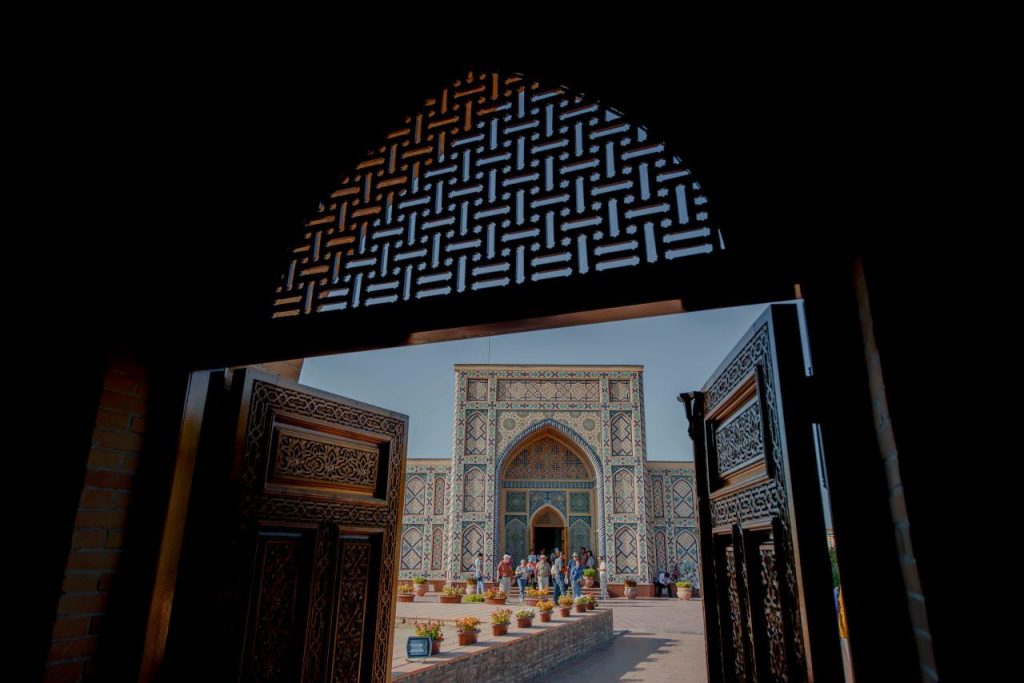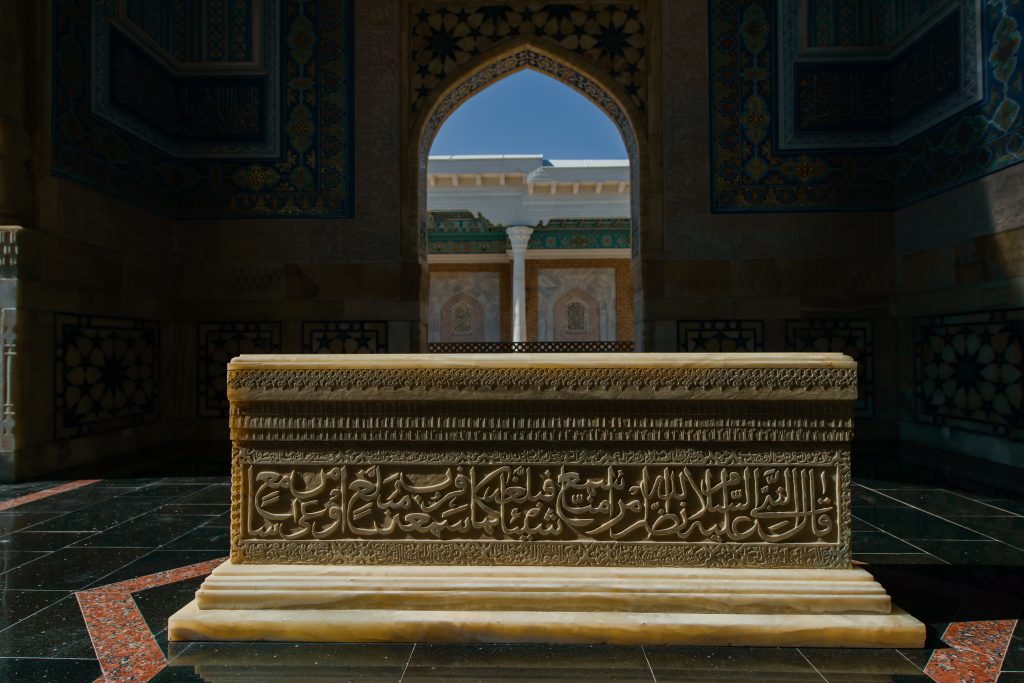
The homeland of Imam Al-Bukhari
Imam al-Bukhari was born in the ancient city of Bukhara, a famous city from the earliest times, currently located in the territory of Uzbekistan, Central Asia.
After the Friday prayer (A.D. 810, July 21) in Bukhara, the 13th of the Islamic month of Eid al-Fitr (Ramadan), Imam al-Bukhari was born. He would adorn the Sunnah of the Prophet (PBUH) and contribute to making it last forever.
Unfortunately for the young al-Bukhari, his father died while he was still an infant, leaving his upbringing to his mother. As he grew older, he became more and more aware of Islamic knowledge, especially the Prophet’s (p.b.u.h.) blessed hadiths. One day a famous scholar of Bukhara, the scholar Ad-Dahili, was teaching the hadith tradition. Al-Bukhari was listening to his lessons with others. Ad-Dahili spoke of a hadith:
Ad-Dahili: The hadith I have been telling you is from Sufyan Abu Zubayr and it was narrated by Ibrahim.
Al-Bukhari: Abu Zubayr never narrated Ibrahim. I should warn you about this fact.
Ad-Dahili (angrily): Stop it, o student! Why do you find errors in my words?
Al-Bukhari: Unless you believe it, look at the original source.
(Ad-Dahili looks up the source from the book on the board standing in front of him).
Ad-Dahili: You are right Muhammad ibn Ismail … (pondering) Honestly, if you have found the sahw (forgotten fact), then it is up to you to correct the chain of transmitters.
Al-Bukhari: Dear master, according to the sources, Az-Zubayr is actually Ibn Addiy and it is narrated by Ibrahim.
According to the sources, Imam Al-Bukhari was able to memorise hadiths at the age of ten.
As he grew older, his enthusiasm became stronger not only to memorise hadiths, but also to divide them into authentic and non-authentic ones. To identify their defects, to investigate hadith narrators, and to be accurate, he recorded their reliability, unreliability, the life of the narrators, their place of birth, dates of birth and death, their interactions with each other, the comparison of the hadiths narrated by various narrators, their interrelationships, and the variety of hadiths. He was dedicated to an in-depth study of various issues, in the collection of hadiths, in the study of the Quranic verses and the relationship between them.
The First Teachers of Imam Al-Bukhari and the Strengths of his Learning Ability
The muarrikhs of Imam al-Bukhari (historians who have written his biography) emphasised the unique strength of his memory, his noble manners and virtues. Many other stories have also been narrated about the strength of Imam Al-Bukhari’s memory.
Soon, Al-Bukhari’s unique ability and intelligence were highly appreciated by many scholars and by the well-known muhaddiths (hadith scholars) who taught him.

It had reached such a level that even prominent scholars were concerned about al-Bukhari’s attendance and feared that they would make mistakes or fail in teaching if he was present in their classes. They appealed to al-Bukhari to correct any mistakes in their books.
In those days, as is stated in historical works, before the departure of al-Bukhari to study elsewhere, there occurred an incident. Salim Ibn Mujahid narrated the occasion:
“One day I went to Muhammad ibn Salam Al-Poykandi’s house and he said to me, if you had come a little earlier, you would have met a boy who memorised seventy thousand hadiths”. Therefore, I turned around, rushed out to meet that boy, and asked him, “Are you the kid who is said to know seventy thousand hadiths?” and he said, “Yes, I know more than that. I will not narrate any hadith until I have known many of the scholars, their birth, death and their place of residence. I also narrate each hadith of the scholars in accordance with the reality in the Holy Quran and the hadiths of the Prophet (PBUH)”. These words of Muhammad to Ibn Salam al-Poykandi also exemplify that al-Bukhari was well respected from a young age.
Muarrikh Shamsuddin az-Zahabi in his novel “Tazkirat ul-huffaz” narrated: “Hashid ibn Ismail said: The Mashaikhs (worship and science leaders) of Basra would often disagree with Imam Al-Bukhari about their views. He was a teenager at that time and would never write hadiths. In this path sixteen days passed, and Muallim (teacher) asked us, “You have heard and written so many hadiths. Show me how many hadiths you have written”. Once we summed up, we had written over fifteen thousand hadiths. Al-Bukhari told us all of them by heart and we even corrected many of the hadiths we had written following his narrations.

Journeys on the Way of Knowledge
As we read books related to the history of hadiths, we find many examples of scholars who would travel from city to city, and through the desert for months, trying to hear or to be sure of the proofs of the hadiths. One can imagine what great desire they had to learn hadiths!
The hadith compilers, who intended to travel around the world, would require several things before departing. For instance, they were obliged to collect all the hadiths from every single narrator in their hometown and only then could they travel to other places.
No matter how perfect a person was, in order to achieve the state of enlightenment, he had to endure the hardships of his journey: suffering hunger, losing his horses and properties just to name but a few. Such noble people simply enjoyed the ordeal to find bliss and enlightenment, and they were ready to spend all their wealth pursuing knowledge and most importantly, they would not hesitate to sacrifice their lives. The complete incarnation of all these qualities in Imam al-Bukhari made it possible for him to become one of the greatest Islamic scholars of all time.
By the age of sixteen, Imam al-Bukhari was heading to the holy shrine, the home of the Prophet’s Companions, and the center of Islam, to Hijazi Sharif (the city of Mecca). As the secretary of Imam Al-Bukhari, Ibn Abdull-Warrok, narrates, when al-Bukhari turned sixteen, he had already learnt the books of ibn al-Mubarak and Waki by heart and then went on the Hajj pilgrimage with his mother and brother. Al-Warrak’s narration reveals that Imam al-Bukhari first came to the Sihat in 210 AH (AD 825).
In 210 hijri, Imam al-Bukhari’s mother and his brother Ahmed arrived in Mecca. Soon after performing Hajj, his mother and brother returned home. He, however, decided to stay in this holy city and started taking part in meetings of the city scholars. There were several prominent scholars living in Mecca at that time. Imam Abdul Walid Ahmad ibn al-Arzaqi, Abdullah Ibn Yazid, Ismail ibn Salim as-Soig, Abu Bakr Abdullah ibn Az-Zubayr and scholar al-Hamidi were among them. In addition to these, Imam al-Bukhari learned the hadiths from many other scholars. After staying in Mecca for a while, Imam al-Bukhari set off for Medina. Students of knowledge flocked to the second holiest city in Islam to learn about the world of the Prophet (PBUH). At the age of eighteen Imam al-Bukhari reached the holy city of Medina, i.e. in 212 AH (AD 827). There were many prominent scholars of the time in that city, such as Ibrahim ibn al-Munzir, Mutrif ibn Abdullah, Ibrahim ibn Hamza, Abu Sabir Muhammad ibn Ubaydullah, and Abdul Aziz ibn Abdullah. Imam al-Bukhari interacted with these scholars and learned much about hadiths from them. In the light of those lunar nights, his first book, “At-Tarikh al-Kabeer” (“The Great History”) was written. According to historians, the journey of Imam Al-Bukhari to Hijaz, Mecca, Medina, Taif, and Jeddah lasted for six years. It was also noted that Imam Al-Bukhari travelled to other countries during the same period.
Imam al-Bukhari then went to Basra, Iraq. He has always said, “I’ve been to Basra four times.” He then travelled to Kufa. He visited this city several times. He also visited Baghdad during his stay in Kufa. The words of Al-Warrak, his secretary, about Imam Al-Bukhari’s travels to Kufa and Baghdad are quoted as saying: “I do not know how many times I have met with experts in Kufa and Baghdad.” When he became convinced that the Kufa’s famous scholars and teachers were reliable, Imam al-Bukhari used to relate their teachings in their own words. In Baghdad, the capital of the Abbasid caliphate, science was flourishing at that time and there were many bright minds from all over the world. For this reason, Imam al-Bukhari, as mentioned above, was in Baghdad several times and was warmly welcomed.
Imam al-Bukhari was also in Damascus, where he learned lessons from several prominent scholars of the period. Then he went down to Egypt. Some sources indicate that Imam al-Bukhari was also in Al-Jazeera (ancient Babylon, Mesopotamia, and later Iraq). Khurasan and Marv, Balkh, Herat, Nishapur, Ray, Djibol, Khurasan were visited by Imam al-Bukhari many times, and Mawarannahr (current Central Asia) was his home country. The sole purpose of Imam al-Bukhari’s visits to these cities and countries was to learn about the science of hadith, communicating with some of the most distinguished scholars, and constantly striving to enrich himself. Al-Khatib al-Baghdadi, the author of “The History of Baghdad,” mentioned in his book that the scholar named Jaffar ibn Muhammad al-Katton quoted Imam al-Bukhari: “I wrote my hadiths quoting maybe a thousand scholars, or even more. There is no single hadith in my books that has remained unquoted.”
Historians have commented on Imam al-Bukhari’s phrase, “or even more” and referenced eighty more teachers. In particular, the scholar Muhammad ibn Abu Hatam recalled that in one of his writings, Imam al-Bukhari said, “I have written my hadiths collecting from one thousand and eighty sheikhs”.
Defective and Authentic Hadiths. Clarifying and Applying Difficulties.
According to muhaddiths (transmitters of hadiths), defective hadiths refer to hadiths that have some uncertainties and doubts about their authenticity, but appear to be somewhat correct. Determining illicit hadiths involves some of the most precise and difficult research in the science of hadith. The study of each hadith includes a comprehensive overview of all the hadiths and all the styles of hadith science, as well as the dates of birth and death of the narrators, from whom they heard and who else narrated this very hadith, The hadith scholars must know and remember word by word and phrase by phrase what they heard and must have fully mastered the art of detecting the true or false word in each hadith.

In case if there was uncertainty in teachers and narrators, their dwellings and interactions or those who did not meet such requirements, such as being acquainted with the various irregularities of the hadith, were unlikely to succeed in the science of hadith. The greatest art mastered by Imam al-Bukhari was the art of detecting illicit hadiths. It has been revealed that some companions themselves narrated some untrustworthy hadiths at those times.
Imam al-Bukhari attained the highest piety, faith and sincerity through the prudence he practiced. For a hadith to be considered authentic, a reliable chain of narrators is needed to connect that saying to the Prophet (PBUH). In this, al-Bukhari excelled.
With these considerations, Imam Al-Bukhari was far from suspicious of hadiths. Allama al-Ajluni in his book Al-Fawaid Ad-dari’i relates the story of Imam al-Bukhari’s godliness, integrity, and being far from slander.
“Imam al-Bukhari was travelling somewhere by sea while he was pursuing knowledge, and he had a thousand dinars on him. One passenger on board approached him with respect and dignity and fell in love with his speeches and narrations. When Imam al-Bukhari saw his affection and friendship towards him, he was friendly and courteous. After several conversations, Imam al-Bukhari told him about the thousand dinars he was carrying with him.
One day, this man woke up suddenly from his sleep. People were shocked when they saw him and asked him what was wrong. He pretended to be a victim and complained, “I had a thousand dinars in my purse and they disappeared.” Inspectors then checked the passengers’ pockets one by one. Meanwhile, Imam al-Bukhari threw the dinars in his wallet into the sea. Authorities also investigated al-Bukhari and found no wallet or money. The searchers rebuked the man for saying he had lost his money and punished him for telling lies. After reaching the destination, everyone got off the ship. Then the man approached Imam al-Bukhari and asked what he had done with his thousand dinars and Imam al-Bukhari said, “I threw it into the sea.” The man asked, “How did you give up so much money?” Imam al-Bukhari said, “O ignorant one, do you not know that I have spent my entire life collecting the Prophet’s hadiths? The entire world has acknowledged my honesty. How could I risk my reputation against the slander of a thief? Is it worth losing a precious penny of the ‘faith and justice’ I have found in my whole life?”
Imam al-Bukhari inherited wealth from his father, Ismail, who, unlike other traders, was careful in all matters of his trade and responded when mistakes or shortcomings were encountered by his staff and assistants. While many traders have doubts cast on them about the wealth they have accumulated, Ismail was careful about his property and avoided any suspicions. Like his father, Imam al-Bukhari intended his business to benefit only those people who are servants of Allah. He always helped scholars, muhaddiths and teachers. He spent five hundred dirhams of his own income on poor and needy people and on scholars. He gave money to scientists, encouraging them to study the hadiths of the Prophet (PBUH) with great interest and enthusiasm, and contributed much to the muhaddiths. In Imam al-Bukhari’s life, patience and endurance, which he never used to consume to excess, were natural to him.
One day, Al-Bukhari got goods sent by one of his father’s beloved disciples, Abu Hafs. On the same day, some merchants came and offered five thousand dirhams for them. He told them “At least, could you please wait for one night?” The next day, other merchants came and promised ten thousand dirhams for these goods. However, al-Bukhari refused, saying, “I intend to give these goods to the traders who came first, and I hate to do anything against my will.”
Imam al-Bukhari, in all circumstances, kept an eye on himself and refrained from pursuing wealth, which he regarded as the worst practice. Umar Ibn Hafs al-Ashkari relates: “We were with Muhammad ibn Ismail in Basra and were busy writing the hadiths. He disappeared for a few days, and we found him naked in a house. He had no clothes left on him. We consulted with each other, collected some dirhams, bought clothes and dressed him up. Then he joined us and engaged in the hadith book.”
Imam al-Bukhari was a very pure man, free from slander and injustice. He always said, “Since I know it is forbidden to talk back, I have never gossiped about anyone.” One of the most important qualities of Imam Al-Bukhari was to avoid any form of fanaticism. As we scrutinise his royal work, Sahih al-Bukhari, we find that the scholar was very attentive and careful in his book. He wrote the hadiths in his book only after a thorough examination of the authenticity of the hadiths he had collected and verified.
As for the Sahih (authentic) work of Imam al-Bukhari, we should note that the authentic text of this book also contains non-Sunni (Editor: Sunni – one of the major branches of Islam) narrators. Imam al-Bukhari, even though he opposed their sect, did not abandon their narration and included it in his book. Whether this tasamuh (tolerance, respect for other denominations) appears to be finite or infinite, according to the tradition amongst scholars, so as not to doubt the hadith, they say that they are also accepted. Certainly, it is taken into account that they do not publicise their denomination, do not spread falsehoods, and do not even dream of spurious interference.

Practice of Acceptance of the Hadith Rules and Obeying Them
The speaker of the Sunnah is the Prophet (PBUH). His followers adhered strictly to these Sunnah. Subsequently, the followers accompanied the other companions and continued adhering to the Sunnah of the Prophet (PBUH). This continued until scholars started specialising in hadiths. Enthusiasm for and interest in the Sunnah of the Prophet Muhammad (PBUH) are also admirable.
If the muhaddiths come up with any hadiths related to their own work, they are so glad that nothing can replace this joy. We well know that archery is not a specialty of the scholars. But since the hadith of the Prophet (PBUH) contains this sunnah, Imam al-Bukhari went out on the field to practice archery. His skill in this area grew so that he could hit the target without fail. His secretary, al-Barrak, says: “I always accompanied him. Only two times did I know that his shot hadn’t hit the target. Everything else was correct with no errors.”
He goes on saying: “One day we went to shoot while we were at Fariyd. Our path would pass through a canyon and eventually lead to a waterfall. We started shooting with a bow. Abu Abdullah’s arrow hit the pillar of the bridge over the river and the pillar split. Seeing this, Abu Abdullah came down and pulled out the arrow, threw his bow and said to us, “Go back!“ When we got back, he said to me, “O Abu Ja’far, I have to have a word to you.” He sighed and breathed deeply. I said, “Sure.” He said, “Go to the owner of the bridge now and tell him we have damaged the bridge’s pillar. Ask his permission to replace the pillar and to forgive us for any inconvenience we have caused. Ask him to let us provide the money to pay for it.” The owner of the bridge was a person named Hamid Ibn al-Ahdar. Knowing the purpose of my visit to him, he said “Give my regards to Abu Abdullah. In addition, say that he is free from any sins. All of my properties have no value compared to him.” When I delivered his message to Abu Abdullah (Bukhari), he smiled in joy and became thrilled.
When Imam al-Bukhari had a construction built, he looked after the builders and took part in the process himself too. “Immediately upon the completion of this building, Imam al-Bukhari would invite all the people and organise a banquet.”
Imam al-Bukhari was a man who, by nature, endured various hardships, who was determined to do something, acted decisively, and never liked to hand over any tasks to other people.
Al-Warrak relates: “Except the hot summer days, we would live in the same room with Abu Abdullah (Bukhari). I would see him get up fifteen to twenty times in the night. Every time he stood up, lit up the lights and arranged the hadiths, labelled them with signs and then went back to bed. When I asked him why he didn’t wake me up, he would say, “You’re a young man and I don’t want to ruin your sleep.”
The Death of Imam Al-Bukhari
When Imam Al-Bukhari returned to his homeland in the last years of his life after nearly forty years of travelling, his fame had spread across the globe and many hadith scholars came to his home to learn from his immense knowledge. Khalid Ibn Ahmad al-Zuhli ruled Tahrir as the Emir of Bukhara. Khalid Ibn Ahmad al-Zuhli asked Imam al-Bukhari to come to his palace and teach him and his sons from “Sahih al-Bukhari” and “At-Tarih”. However, Imam al-Bukhari, ignoring the esteem and wealth of the world, declined the offer despite provocations by other scholars like Imam Malik. To the messenger from the Amir, Imam al-Bukhari said, “I will not bring knowledge to the door of the rulers.”

The Amir then sent a representative, saying, “If Imam al-Bukhari does not want to come to the Emir’s palace, he should give a special time for the Emir, meaning that no other people will attend and disturb.” However, Imam al-Bukhari ignored this request as well. The Emir was enraged and regarded this as an insult to the Emirate, to public morality and to his honour. However, he feared to use the authority of the Sultan directly against the Imam, so instead he tried to trick him. He incited Haris ibn Abul Warka (one of the leading scholars of the Hanafi movement in Bukhara) and a group of scholars.
In fact, Imam al-Bukhari, with his extensive knowledge and persistence of character, was greatly respected and had a lot of influence among the Muslim people there. Therefore, those assigned by the Emir to spread gossip about Bukhari tried to seduce them. They deliberately spread the rumour that “Imam al-Bukhari affirms that the Qur’an alphabets are created.” Because of this false slander, the city of Bukhara collapsed and the situation in the city deteriorated and Imam al-Bukhari was ordered to leave the city. As Imam Bukhari left his motherland, the slanderers and hypocrites saddened him. A few days later, they were punished according to their deeds. For instance, one of the Khurasan rulers called Khalid bin Ahmad, the Emir of Bukhara, had arrested him when he arrived. The Emir eventually died in captivity and humiliation. In addition, those who committed immorality against Imam al-Bukhari were also subjected to various calamities. Al-Harith Ibn Warka was humiliated with his family. The Imam saw more and more casualties among them.
Imam al-Bukhari left Bukhara and came to Poykand (a village near Bukhara, Uzbekistan). His opponents had attempted to spread slanderous words about him in Bukhara to the public. These bad words had reached Poykand before the scholar had arrived, and it divided the people of the town into two categories. Some of them defended the scholar and respected his fame, while the second category followed the wicked words of this gossip. Imam al-Bukhari was aware of the conflict between the people of Poykand and did not consider himself worthy of living in the city. The people of Samarkand also knew that Imam al-Bukhari had arrived in Poykand. So Imam al-Bukhari left Poykand and stopped at a relative who lived in the village of Khartang near Samarkand.
Abdul Quddus ibn al-Jabbar al-Samarkand said that he had heard Bukhari one night, having finished the night prayer (salat ul-lail), saying, “O Allah, no matter how wide the world is, it seems there is no place for me anymore. I think it is time for you to take me to yourself, please”. And he (Abdul Quddus) says: “A month after this incident, Imam al-Bukhari passed away to the mercy of Allah.”
Muhammad ibn Abi Hatam al-Varraq writes: “I heard from Ghalib Ibn Jabril. When Imam al-Bukhari stopped in his house when he had arrived in Khartang he would say: “He (Imam al-Bukhari) lived in my house for a few days, and when the people of Samarkand came and invited him to their town, he became ill.””
Ghalib Ibn Jabril says, “He was ready to ride a horse, and he wore a suit and a jacket. After riding about twenty yards (I was helping him under his arm, while another man was holding the horse’s bridle), he begged us: “Leave me alone. I feel bad.” We slowly dismounted him. He whispered, praying a few prayers in his heart, lay on the ground, and passed away. Then a lot of sweat poured out of him.”
The death of Imam al-Bukhari occurred on the night of Eid al-Fitr, 256 AH (1 September 870), and he lived thirteen days less than sixty-two years. He kept sweating until the gassel (person who bathes the dead body) washed his body and wrapped it in a shroud. Some even tried to transport Imam al-Bukhari’s body to Samarkand. However, there was a disagreement about where they should bury him. He was then buried during the afternoon of Salat-al Zuhr, on Eid al-Fitr in the village of Khartang, where he had died.
After the burial of Imam al-Bukhari, a delicate fragrance smothered his grave, which was compared to the scent of musk by historians. This story spread among people and they came even from remote places to visit his grave and take away some sand it for themselves.
Many scholars expressed their sorrow and grief over the death of Imam al-Bukhari. Yahya Ibn Ja’far al-Beykandi wrote about this with bitterness: “With the death of Muhammad ibn Ismail, enlightenment has gone away…”
The works of Imam Al-Bukhari
According to the sources, Imam al-Bukhari wrote over twenty works including:
- Al-Tarikh al-Kabeer (Great History). He created this work at night in al-Masjid al-Nawawi in Medina – the Prophet’s (PBUH) mosque, between the Prophet’s grave and his minaret when Imam al-Bukhari was eighteen years old.
- Al-Tarikh al-Awsat. This book was narrated by Abdullah Ibn Abd al-Salam al-Haffaf and Zanjawih ibn Ahmad al-Dubad, and was initially derived from Imam al-Bukhari.
- Al-Tarikh as-Saghir (Small History). This work by Imam Al-Bukhari is also a fascinating historical book because the connection of the knowledge of the narrators with the science of hadith is like the relationship between the soul and the body. Imam al-Bukhari narrated this book from Abdullah Ibn Muhammad Abdul Rahman al-Alqar.
- Ibn Tahir mentioned the work of “Al-Jami’ al-Kabeer“ but we are not aware of its details. We do not know if a manuscript was saved from him. Hoji Khalifa, author of the book Kashf al-Zunun, is also limited to such information.
- Khalk Al-‘Afal Al-ibad (The Nature of the Work of Allah’s Servants). The Companions and the followers used to reject false groups based on verses and hadiths of the Qur’an. This is the style of this book. The idea itself is eternal knowledge. It is narrated by Imam al-Bukhari from Yusuf ibn Rayhan Ibn Abdusamad and scholar Al-Farabi. The book rejects al-Jahmiyya and al-Mutattala’s false groups, and the memoirs of the Companions and Tabi’in are combined with verses from the Quran and the Prophet’s (PBUH) hadith.
- Kitab as-Zuafo as-Saghir. It lists the names of the weaker narrators in alphabetical order in the book az az-Zafaf as-sagir. In most cases, it explains the reasons for the weakness in the name of the sheikh of the narrators. The book states that Imam al-Bukhari was very cautious in his efforts to identify the weaknesses of the narrators.
- Al-Musnad Al-Kabeer (Great Musnad) and At-Tafsir al-Kabeer (The Great Interpretation). These books were mentioned by Al-Firibiy, a disciple of Imam Al-Bukhari. Unfortunately, we do not know the exact details about them; we do not know whether any manuscripts exist, and we do not know about their narrator.
- Kitab Al-Hibati (The Book of Charity). Muhammad ibn Abu Hatam, secretary of Imam al-Bukhari, writes about this work: “He has created a book about charity, and there are about five hundred hadiths…”
- As for the book Asami’ al-Sahabah (The Names of the Companions), Abu al-Qasim ibn Munda said that it was narrated by Imam Al-Bukhari through Faris, and much has been said about him.
- Kitab Al-Wuhdon (The Book on Unity). Ibn Mundah quotes much of this work. Imam al-Bukhari mentions only the scholars who narrated a single hadith in it.
- Al-Khalili referred to Kitab al-Mabsut (The Complete Book) in his work Al-Irshad. The book is narrated by Imam Al-Bukhari from Muhib ibn Samim, in which Imam al-Bukhari elaborated on fiqh (Islamic law) issues in light of the conclusions he drew from the blessed hadiths.
- Abu al-Qasim ibn Munda narrated the work of Kitab al-Ilal (The Book of Illustrated Hadiths) narrated by Muhammad ibn Abdullah Ibn Hamdawi, and it is narrated by Abu Muhammad ibn Abdullah Ibn al-Bukhari, by Imam al-Bukhari.
- Abu Akhmad al-Khakim cites the book Kitab al-Kuna (The Book of Days) and cites it in his classifications. There is a great need for scholars to learn this knowledge, as it is required to specify the days so as not to substitute certain narrators of hadith. Because of this ignorance, many prominent scholars have made various mistakes.
- Imam al-Tirmidi refers to Kitab al-Favaid (The Book on Useful Materials) in his books called “Al-Jomi” in the “Kitab al-Manaqib”. In this work, he collected sensitive phrases related to illicit hadiths.
- The book Al-Adab al-Mufrad (The Only Book on Morals) is a collection of wisdom that outlines the moral values and ethics of the Prophet (PBUH).
- The book Juz’ Raf’a al-Yadayn (Raising the Two Hands) discusses and reviews the legends about raising the hand of someone. Mahmud Ibn Ishaq narrated this work from al-Khazaei. He was one of the last apprentices educated by Imam al-Bukhari in Bukhara.
- The story of Birr al-Walidain (Love for Parents) is narrated by Imam al-Bukhari from Muhammad ibn Dallawih. The theme of the book is also clear.
- Imam al-Doruqutnini in his book called “Al-Muttalaf and al-Mukhtalaf” recites Bukhari’s Kitab al-Ashribati (Book of Drinks), a translation of al-Qaisa.
- “Qathoya Al-Sahaba Wat-tobi’in” (“Issues of Companions and Followers”). Imam al-Bukhari classified this blessed book in 212 AH before the book At-Tarih al-Kabir. Perhaps this work is very useful in that it gives Muslims peace of mind when they see the practical interaction of the scholars.
- Kitab al-Riqoq (“The Book of Manners”). Haji Khalifa informs us about this book and gives the following text only. “This is one of the hadiths books of Al-Bukhari’s “Kitab Al-Riqoq”.
- Al-Jomi ‘as-Saghir fil-hadith (Hadith Collection). This is what Haji Khalifa wrote in Kashf Al-Zunun. It was narrated by Imam al-Bukhari from Abdullah ibn Muhammad al-Askar. Al-Hafiz Ibn Hajar also said, “This is one of the works of Imam al-Bukhari.”
- The book Juz’ al-Qiraati Khalf al-Imam (“The Reading behind the Imam”) is a well-known treatise by Imam al-Bukhari. In it, he presented evidence from hadiths and other written monuments, proving that it is possible to recite behind the Imam and refuting the opposing views beautifully. From this, Imam al-Bukhari has a complete knowledge of the ethics of debate.
Many of his works have either not been found or are no longer in existence. However, even this list demonstrates the extent and scope of Imam al-Bukhari’s knowledge and wisdom.
Obviously, we should mention the work of Imam Al-Bukhari, known as “Al-Jomi’ al-Sahih” derived from the name “Sahih Al-Bukhari”. The importance of this work is unique.
There is no country in the world where Islam is spreading, where “Sahih Al-Bukhari” is not used! The creation of this collection is one of the most noteworthy. This blessed book has honoured Imam al-Bukhari with the highest rank in the world. No book of any hadith in the history of Islam, nor any classification of any Imam, has had such a reputation or position, being honoured by the Fiqh – a book of Allah that is popular with the whole Muslim community. Imam Al-Bukhari’s Sahih gave him unprecedented fame and bounty.
Al-Jomi’ al-Sahih is the highest rank after guidance in the Qur’an. It is like a mountain that will never fade away. It is such a treasure that if we try to write about it, we will need to write a multi-volume book.
Nine thousand and eighty-two hadiths are collected in the Sahih Al-Bukhari (Al-Jomi’ al-Sahih), created by Imam al-Bukhari after sixteen years of immense zeal and great effort. Several narrators have recounted, as there are duplicates among some of these. Thus, seven thousand three hundred and ninety-seven unique and authentic hadiths exist. They were drawn from six hundred thousand hadiths based on the classification created by Imam Al-Bukhari.
The English orientalist Thomas Williams Bill wrote in his book Oriental Studies, published in London in 1890: “The most revered work after the Holy Quran is Imam al-Bukhari’s Sahih. In their spiritual and worldly affairs, all men rely on him. This book not only reflects the revelation to Muhammad (PBUH), his teachings, his situation, but also the interpretations of many of the most difficult places in the Qur’an.”
Indeed, al-Bukhari himself, and his faithful disciple and secretary, Al-Warrak, also confirmed this statement in their time.
Imam al-Bukhari says. “In my dream, I saw the Messenger of Allah (PBUH) as if I was standing with him and expelling something standing on him. When I asked some commentators about it, they commented, “You are expelling lies from him.” Meanwhile, The Prophet (PBUH) himself entrusted me with the creation of “al-Jami ‘as-Sahih”.
Al-Warrok, the secretary of Al-Bukhari, cites Bukhari’s sayings: “I have classed these hadiths out of six hundred thousand hadiths. I have classified them three times.” There is no contradiction between these two ideas, as any author re-writes his or her work several times.
The work of Imam al-Bukhari in the field of hadith, has made his name known worldwide. There are various ways to study this invaluable work. For example, in the town of Tarablus in Libya, every year, during the month of Ramadan, the entire city reads this valuable source for three months (Rajab, Sha’ban, and Ramadan) and applies the ideas in these hadiths to their lives. The festivities end with a letter from the “Sahih al-Bukhari”.
Young men who were called up for military service in Morocco, swore by the word of Allah in the Holy Quran and they put their left hand on the Sahih works of Imam al-Bukhari. This rule has been in use ever since. In many Arab countries, television broadcasts are regularly aired on certain days of the week of the programme “Imam Al-Bukhari Lessons” (Durus Al-Imam Al-Bukhari).
Descendants of Imam Al-Bukhari
The author of “Mushkot al-Masabih,” Waliuddin al-Khatib al-Tabrizi and “Mullah Ali al-Qari informs us that Imam al-Bukhari had no descendants at all. Historians do not mention scholars’ family life. Although hundreds of scholars are mentioned in the history books, there is no sign that he was married. Based on these weak assumptions and with no convincing evidence, we cannot dare suggest that Imam al-Bukhari refused a sunnah of marriage.
Regardless of having no direct descendants, Imam Al-Bukhari’s spiritual descendants and followers number more than one billion two hundred million.
By Prof. Ubaydulla Uvatov
